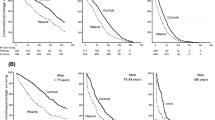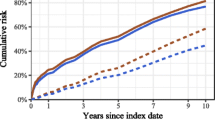Abstract
Older persons who have suffered a hip fracture (HFx) are at increased risk of subsequent hip fractures. The cumulative incidence of a second hip fracture (SHFx) has been estimated in 8.4%; however, no studies have been carried out in our country, and the information on risk markers of SHFx is limited. The aim of this study was to estimate the incidence, explore trends, and examine predictors of SHFx in a suburban population of Spain. An observational longitudinal retrospective study was performed in a universal health coverage setting (Alcorcón, 1999–2011). Data were obtained from the area hospital discharge database. Annual incidence of HFx was estimated over 100,000 population (general and persons with HFx), and median time to SHFx by Kaplan–Meier tables. Cox regression was used for the analysis of association between SHFx and baseline predictors, measured by hazard ratio (HR). Among the 3430 patients who suffered a first HFx in the study period, 255 (7.4%) experienced a SHFx (4.5% of men and 8.5% of women). Median time between the first and second HFx was 3.7 years (SD 3.2). Annual incidence of HFx in population over 45 was 290.5 per 100,000 inhabitants (131.03 in men and 433.11 in women). Annual incidence of SHFx among persons with a HFx was 956.7 per 100,000 (1052.1 in women and 595.5 in men). There was a decline trend along the study period with an annual reduction of 10.4% (95% CI 7.7–13.0%; p < 0.001) in both sexes. The following associations were found: female sex (HR 1.41, 95% CI 0.97–2.02), age (HR 1.03, 95% CI 1.01–1.04), living in a nursing house (HR 1.46, 95% CI 1.10–1.94), and moderate to severe liver disease (HR 4.96, 95% CI 1.23–20.06). In our environment the occurrence of a SHFx is 7.4%, three-fold risk compared to no previous HFx. Being woman, elderly, living in a nursing home, and having severe to moderate liver disease may be important predictors of a SHFx. There seems to be adequate time between the first and the SHFx for interventions that may reduce the risk.


Similar content being viewed by others
References
Parker M, Johansen A (2006) Hip fracture. BMJ 333:27–30
Ryg J, Rejnmark L, Overgaard S, Brixen K, Vestergaard P (2009) Hip fracture patients at risk of second hip fracture: a nationwide population-based cohort study of 169,145 cases during 1977–2001. J Bone Miner Res 24:1299–1307
Center JR, Nguyen TV, Schneider D, Sambrook PN, Eisman JA (1999) Mortality after all major types of osteoporotic fracture in men and women: an observational study. Lancet 353:878–882
O’Neill TW, Roy DK (2005) How many people develop fractures with what outcome? Best Pract Res Clin Rheumatol 19:879–895
Cree M, Soskolne CL, Belseck E, Hornig J, McElhaney JE, Brant R, Suarez-Almazor M (2000) Mortality and institutionalization following hip fracture. J Am Geriatr Soc 48:283–288
Svedbom A, Hernlund E, Ivergard M, Compston J, Cooper C, Stenmark J, McCloskey EV, Jonsson B, Kanis JA, EU Review Panel of IOF (2013) Osteoporosis in the European Union: a compendium of country-specific reports. Arch Osteoporos 8:137 Epub 2013 Oct 11
Klotzbuecher CM, Ross PD, Landsman PB, Abbott TA, Berger M (2000) Patients with prior fractures have an increased risk of future fractures: a summary of the literature and statistical synthesis. J Bone Miner Res 15:721–739
Center JR, Bliuc D, Nguyen TV, Eisman JA (2007) Risk of subsequent fracture after low-trauma fracture in men and women. JAMA 297:387–394
Huntjens KM, Kosar S, van Geel TA, Geusens PP, Willems P, Kessels A, Winkens B, Brink P, van Helden S (2010) Risk of subsequent fracture and mortality within 5 years after a non-vertebral fracture. Osteoporos Int 21:2075–2082
vanStaa TP, Leufkens HG, Cooper C (2002) Does a fracture at one site predict later fractures at other sites? A British cohort study. Osteoporos Int 13:624–629
Port L, Center J, Briffa NK, Nguyen T, Cumming R, Eisman J (2003) Osteoporotic fracture: missed opportunity for intervention. Osteoporos Int 14:780–784
Bliuc D, Ong CR, Eisman JA, Center JR (2005) Barriers to effective management of osteoporosis in moderate and minimal trauma fractures: a prospective study. Osteoporos Int 16:977–982
Eisman J, Clapham S, Kehoe L, Australian BoneCare Study (2004) Osteoporosis prevalence and levels of treatment in primary care: the Australian BoneCare Study. J Bone Miner Res 19:1969–1975
Majumdar SR, Rowe BH, Folk D, Johnson JA, Holroyd BH, Morrish DW, Maksymowych WP, Steiner IP, Harley CH, Wirzba BJ, Hanley DA, Blitz S, Russell AS (2004) A controlled trial to increase detection and treatment of osteoporosis in older patients with a wrist fracture. Ann Intern Med 141:366–373
Briancon D, de Gaudemar JB, Forestier R (2004) Management of osteoporosis in women with peripheral osteoporotic fractures after 50 years of age: a study of practices. Joint Bone Spine 71:128–130
Fukushima T, Sudo A, Uchida A (2006) Bilateral hip fractures. J Orthop Sci 11:435–438
Johnell O, Kanis JA, Oden A, Sernbo I, Redlund-Johnell I, Petterson C, De Laet C, Jonsson B (2004) Fracture risk following an osteoporotic fracture. Osteoporos Int 15:175–179
Kim SM, Moon YW, Lim SJ, Yoon BK, Min YK, Lee DY, Park YS (2012) Prediction of survival, second fracture, and functional recovery following the first hip fracture surgery in elderly patients. Bone 50:1343–1350
Lawrence TM, Wenn R, Boulton CT, Moran CG (2010) Age-specific incidence of first and second fractures of the hip. J Bone Joint Surg Br 92:258–261
Lonnroos E, Kautiainen H, Karppi P, Hartikainen S, Kiviranta I, Sulkava R (2007) Incidence of second hip fractures. A population-based study. Osteoporos Int 18:1279–1285
Shabat S, Gepstein R, Mann G, Kish B, Fredman B, Nyska M (2003) The second hip fracture—an analysis of 84 elderly patients. J Orthop Trauma 17:613–617
vanHelden S, Cals J, Kessels F, Brink P, Dinant GJ, Geusens P (2006) Risk of new clinical fractures within 2 years following a fracture. Osteoporos Int 17:348–354
vanGeel Tineke ACM, Huntjens KMB, van den Bergh Dinant GJ, Geusens PP (2010) Timing of subsequent fractures after an initial fracture. Curr Osteoporos Rep 8:118–122
Shen SH, Huang KC, Tsai YH, Yang TY, Lee MS, Ueng SW, Hsu RW (2014) Risk analysis for second hip fracture in patients after hip fracture surgery: a nationwide population-based study. J Am Med Dir Assoc 15:725–731
Nymark T, Lauritsen JM, Ovesen O, Röck ND, Jeune B (2006) Short time-frame from first to second hip fracture in the Funen County Hip Fracture Study. Osteoporos Int 17:1353–1357
Chen FP, Shyu YC, Fu TS, Sun CC, Chao AS, Tsai TL, Huang TS (2017) Secular trends in incidence and recurrence rates of hip fracture: a nationwide population-based study. Osteoporos Int 28:811–818
Hsiao PC, Chen TJ, Li CY, Chu CM, Su TP, Wang SH, Pan HH, Wang KY (2015) Risk factors and incidence of repeat osteoporotic fractures among the elderly in Taiwan: a population-based cohort study. Medicine (Baltimore) 94:e532
Omsland TK, Emaus N, Tell GS, Ahmed LA, Center JR, Nguyen ND, Gjesdal CG, Forsmo S, Schei B, Søgaard AJ, Meyer HE (2013) Ten-year risk of second hip fracture. A NOREPOS study. Bone 52:493–497
Ballane G, Cauley JA, Luckey MM, Fuleihan G (2014) Secular trends in hip fractures worldwide: opposing trends East versus West. J Bone Miner Res 29:1745–1755
Cooper C, Cole ZA, Holroyd CR, Earl SC, Harvey NC, Dennison EM, Melton LJ, Cummings SR, Kanis JA, IOF CSA Working Group on Fracture Epidemiology (2011) Secular trends in the incidence of hip and other osteoporotic fractures. Osteoporos Int 22:1277–1288
Zhu Y, Chen W, Sun T, Zhang Q, Liu S, Zhang Y (2015) Epidemiological characteristics and outcome in elderly patients sustaining non-simultaneous bilateral hip fracture: a systematic review and meta-analysis. Geriatr Gerontol Int 15:11–18
Klotzbuecher CM, Ross PD, Landsman PB, Abbott TA, Berger M (2000) Patients with prior fractures have an increased risk of future fractures: a summary of the literature and statistical synthesis. J Bone Miner Res 15:721–739
Kanis JA, Johnell O, De Laet C, Johansson H, Oden A, Delmas P, Eisman J, Fujiwara S, Garnero P, Kroger H, McCloskey EV, Mellstrom D, Melton LJ, Pols H, Reeve J, Silman A, Tenenhouse A (2004) A meta-analysis of previous fracture and subsequent fracture risk. Bone 35:375–382
Mazzucchelli Esteban R, Perez-Fernandez E, Crespi-Villarias N, Garcia-Vadillo A, Rodriguez-Caravaca G, Gil de Miguel A, Carmona L (2017) Trends in osteoporotic hip fracture epidemiology over a 17-year period in a Spanish population: Alcorcon 1999–2015. Arch Osteoporos 12:6
Pueyo-Sanchez MJ, Larrosa M, Suris X, Casado E, Auleda J, Fuste J, Ortun V (2016) Secular trend in the incidence of hip fracture in Catalonia, Spain, 2003–2014. Age Ageing 46:324–328
Hawley S, Leal J, Delmestri A, Prieto-Alhambra D, Arden NK, Cooper C, Javaid MK, Judge A, REFReSH Study Group (2016) Anti-osteoporosis medication prescriptions and incidence of subsequent fracture among primary hip fracture patients in england and wales: an interrupted time-series analysis. J Bone Miner Res 31:2008–2015
Sogaard AJ, Holvik K, Meyer HE, Tell GS, Gjesdal CG, Emaus N, Grimnes G, Schei B, Forsmo S, Omsland TK (2016) Continued decline in hip fracture incidence in Norway: a NOREPOS study. Osteoporos Int 27:2217–2222
Giannini S, Sella S, Rossini M, Braghin D, Gatti D, Vilei MT, Amabile A, Fusaro M, Frigo AC, Sergi G, Lovato R, Nobile M, Fabris F, Adami S (2016) Declining trends in the incidence of hip fractures in people aged 65 years or over in years 2000–2011. Eur J Intern Med 35:60–65
Ramón Mazzucchelli, Elia Pérez Fernández, Natalia Crespí, Alberto García-Vadillo Juan (2017) Trend in osteoporotic hip fracture epidemiology over a 17-year period in a Spanish population: Alcorcón 1999–2015. Arch Osteoporos 12:84
Azagra R, Lopez-Exposito F, Martin-Sanchez JC, Aguye A, Moreno N, Cooper C, Diez-Perez A, Dennison EM (2014) Changing trends in the epidemiology of hip fracture in Spain. Osteoporos Int 25:1267–1274
Berry SD, Samelson EJ, Hannan MT, McLean RR, Lu M, Cupples LA, Shaffer ML, Beiser AL, Kelly-Hayes M, Kiel DP (2007) Second hip fracture in older men and women: the Framingham study. Arch Intern Med 167:1971–1976
Chiu KY, Pun WK, Luk KD, Chow SP (1992) Sequential fractures of both hips in elderly patients–a prospective study. J Trauma 32:584–587
Yamanashi A, Yamazaki K, Kanamori M, Mochizuki K, Okamoto S, Koide Y, Kin K, Nagano A (2005) Assessment of risk factors for second hip fractures in Japanese elderly. Osteoporos Int 16:1239–1246
Santos LA, Romeiro FG (2016) Diagnosis and management of cirrhosis-related osteoporosis. Biomed Res Int 2016:1423462
Moll MA, Bachmann LM, Joeris A, Goldhahn J, Blauth M (2016) Parameters pointing at an increased risk for contralateral hip fractures: systematic review. Geriatr Orthop Surg Rehabil 7:45–61
Toledano Martínez E, Hernández García MA, PuñetPellise R y García Vadillo JA (2009) Instauración de tratamiento de la osteoporosis y su cumplimiento tras la fractura de cadera en el area sanitaria 2 de la Comunidad de Madrid. Reumatol Clin. 2009;5(EspecCong 1):62:62
Author information
Authors and Affiliations
Corresponding author
Ethics declarations
Conflict of interest
Ramón Mazzucchelli, Elia Pérez-Fernández, Natalia Crespí, Alberto García-Vadillo, Gil Rodriguez Caravaca, Angel Gil de Miguel and Loreto Carmona declare no conflict of interest in relation to the study and data presented herein.
Human and Animal Rights and Informed Consent
The study was approved by the ethical committee of our hospital. Patient consent is not required by the Spanish law for study based on routine electronic data.
Electronic Supplementary Material
Below is the link to the electronic supplementary material.
Rights and permissions
About this article
Cite this article
Mazzucchelli, R., Pérez-Fernández, E., Crespí, N. et al. Second Hip Fracture: Incidence, Trends, and Predictors. Calcif Tissue Int 102, 619–626 (2018). https://doi.org/10.1007/s00223-017-0364-2
Received:
Accepted:
Published:
Issue Date:
DOI: https://doi.org/10.1007/s00223-017-0364-2




